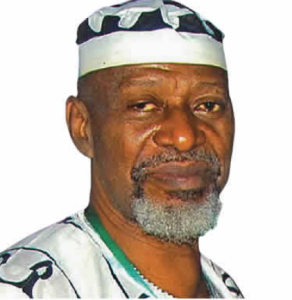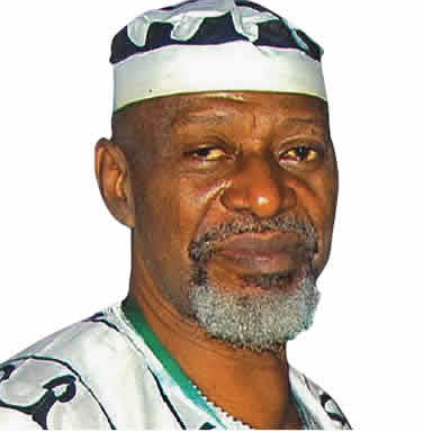By Owei Lakemfa
I drove to Mamman Vatsa Writers Village, Mpape, Abuja. It is a huge sprawling estate of multiple storey buildings, many under construction. It is easy to get lost in this maze that is the home of the Association of Nigerian Authors, ANA. Somebody from the hilly top pointed at a building in what may well be a valley.
Outside the huge theatre, I found nobody. I was confident there were people inside. But it was like a void. Finally, I found somebody who confirmed a reading by Odia Ofeimum was scheduled for the theatre. But that was still some three hours away. I knew that, but I was also aware a pre-reading session was going on. The task was to locate it.
I finally did in the Femi Osofisan National Secretariat of ANA. In the packed hall was the most diverse array of writers I have ever seen in terms of demographic composition. There were nursery and primary school children with an average age of nine; youths, mainly from the University of Abuja and of course; Odia, 73, the Lagos-based political scientist, essayist, poet and writer who has gifted humanity over 43 books.
There was the lively banter whether the man, known nationally from the 1970s simply as Odia Ofeimum, with no titles whatsoever, is a ‘living legend’ as some called him, or a ‘living ancestor’ as others prefer to call him.
In a sense, he is an ancestor of ANA. When the writers association was to be registered, it was Odia, as General Secretary, who placed the public notice in the Thursday, October 24, 1985 edition of the Daily Times Newspapers. The advertised Trustees of the writers association were Professor Chinua Achebe, one of the most famous novelists in the universe. He was President. The second Trustee, Professor Wole Soyinka, under who I studied Drama in Ife, of course, needs no introduction. The third Trustee, was Major General Mamman Vatsa who secured the writers village for all writers in the country. Vatsa’s story is the stuff of tragic drama. He was a well-known writer in a military with an anti-intellectual tradition.
On March 5, 1986, his colleagues in uniform, led by General Ibrahim Badamosi Babangida, his childhood friend, and best-man, tied Vatsa, 46, to the stake, and sent him out of the world in a hail of bullets. His crime was for allegedly harbouring thoughts to overthrow the military regime. To add to the drama, his death was announced on network television, over one hour before he was executed.
This January 27, 2024 pre-reading session was by the Mbari Club, a body funded by intellectual power house, Professor Udenta .O. Udenta. When he turned 60 in 2023, Udenta off-loaded 23 books on the public.

ANA President, Dr Usman Oladipo Akanbi, who presided, fashioned out a consensus in the house which was that Odia should be referred to as a ‘Living Legend’ not ancestor. B.M.Dzukogi, former ANA National Secretary with at least ten books under his belt, who sat next to me, nodded enthusiastically in agreement.
We then moved to the main theatre for the ‘Odia Reading’ and literary festival which included performances by various artistes and prizes, especially for high school children who livened up the audience.
He read poem after poem and just as he seemed like an aircraft about to take off, he was reminded that the time was flying and he still had a panel discussion amongst other programmes.
I particularly loved the poem: ‘Yes, Na Book We Go Chop!” dedicated to Professor Chima Anyadike. He belted out the lyrics: “Believe it, brotherman, that their death-deal brooks no space for the alphabet to dance, and no yes for the big drums to echo our long forbearance…you belted indifference, stung by the cynics belching swearwords demanding: Na book we go chop? Damn them! We have seen our world remade by your love of books.”
Odia revealed that one of the greatest challenges he had to confront in life was the prediction that he would be of no use. His mother had believed this childhood prophesy. When he dropped out of school, it seemed to fall in line with this prediction. But he saw this as a challenge and moved to Benin City where his writings got him a job. However, he lost the job following a workers strike from which he refused to back out.
He made his way to Lagos, becoming a labourer, including a petrol attendant and factory worker. In all these, he focused on self-education. He passed the Ordinary and Advanced Level school certificate, and gained admission into the University of Ibadan where he read Political Science. He worked in the Federal Civil Service, as a teacher, and then, as the Private Secretary of Chief Obafemi Awolowo, perhaps Nigeria’s most programmatic political leader. Awolowo was known to pick only persons with photographic brains as his Private Secretary.
Odia left the prestigious Guardian Newspapers Editorial Board on a Commonwealth fellowship to Oxford University. He seemed settled in Britain. But I was surprised when in mid-1993 I ran into him in Anthony Village, Lagos. He was coming from the Imaria Street home of pro-Democracy leader, Dr. Beko Ransome-Kuti.
The June 12 presidential election had been annulled by the military regime, the country was in turmoil and Odia did not see how he could be out of a fight for the soul of the country. So, he took the next available flight to the country. He participated in the street battles and joined the underground press to fight military dictatorship.
This visit to the writers’ village was for me, a pilgrimage. I met mentors like Professor Nuhu Yaqub, former Vice Chancellor, Universities of Abuja and Sokoto State; veteran journalist, Tunji Ladner Jr; and retired Commissioner of Police and arts promoter, Emmanuel Ojukwu. I also got acquainted with the poet with the rhythmic name, Kabura Zakama, a veterinary doctor whose collection of poems, The Man Lived, won the 1999 ANA Poetry Prize.
To Odia, the reading was a sort of homecoming, having been off ANA activities for some time. He had for six years, been ANA Publicity Secretary and, General Secretary from 1982, and its President for four years from 1993. But he had gotten disillusioned about fights over the lands of the writers village, some of which were lost.
To him, the greatest asset of Nigerian writers is unity which can be further solidified by readings, performances, workshops and culturing the young.
A great polemicist whose writings cover a wide range of human life, including politics, Odia said of the significance of his reading at the Writers Village: “Some people thought I had stopped writing poetry, but frankly, it is the only thing I have really done.”
Dear readers, we really need your support to keep on serving you with authoritative, truthful, and juicy stories everyday. For your support, please reach out to the editor @gavelinternational66@gmail.com

